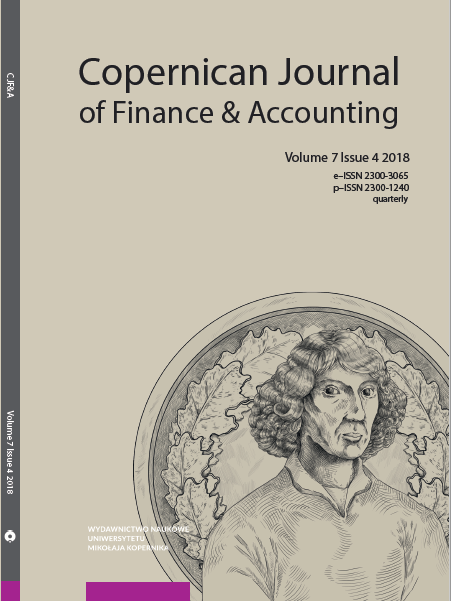CRYPTO CURRENCY – A NEW CHALLENGE FOR THE ECONOMY OF GEORGIA
DOI:
https://doi.org/10.12775/CJFA.2018.022Keywords
cryptographic currency, electronic money, legal regulation, blocks chain, bitcoinAbstract
The popularity of electronic currencies on the world innovative technology market increases daily. The history of currency development and the need for additional monetary means has led to the creation of a crypto currency that has had a substantial impact on the financial world. The world’s largest companies have received crypto currency in the form of payment. At the same time, in a number of states the creation of regulatory legislative acts on virtual currency is underway. The paper aims to study a cryptographic currency and its positive and negative consequences, main trends of development in the world and particularly, in Georgia. The paper is based on the qualitative and quantitative methods of research. Also, we have analyzed the content of the legal documents. We used the method of statistical analysis and the reviewed practical examples of other countries. In addition, we used questionnaires and interviews of civil society members in Georgia for gathering information and to assess the tendency of public attitudes toward crypto currencies. Georgia can be said to be an emerging space for the development of cryptographic currency market because there is no adequately developed regulatory framework, there is a huge risk for a sustainable and inclusive development of the economy, as well as the public and its welfare. The question of regulation of cryptographic currency is problematic for all countries, including Georgia, because it is the case when the theoretical issue is not properly studied and consequently it is difficult to develop adequate policies. Based on the research we can conclude that the establishment of crypto currency is a serious threat to the central banks to produce official macro-economic statistics, which creates problems for the correct implementation of monetary policy. At the present stage there is no joint approach to regulatingvirtual currencies. However, the central banks of the world continue to cooperate in formulating a common approach.
References
Ellis, S. (2013). A Cryptography Primer. Chicago: Cura Corporation.
European Banking Authority (2014). EBA Opinion on ‘virtual currencies’. http://eba.europa.eu/documents/10180/657547/EBAOp2014-08+Opinion+on+Virtual+Cur rencies.pdf (accessed: 10.12.2018).
European Central Bank (2012). Virtual Currency Schemes. Frankfurt am Main: Eurosystem, http://www.ecb.europa.eu/pub/pdf/otheR/virtualcurrencyschemes201210en.pdf (accessed: 10.12.2018).
Greenberg, A. (2011). Crypto Currency, http://www.forbes.com/forbes/2011/0509/technology-psilocybin-bitcoins-gavin-andresen-crypto-currency.html (accessed: 10.12.2018).
Hayek, F. (1976). Denationalization of Money: An Analysis of the Theory and Practice of Concurrent Currencies. Institute of Economic Affairs.
Lekashvili, E., & Gaprindashvili, G. (2014). Social Integration in the Context of Regional Economic Integration (On the Example of the South Caucasian States). In A. Biagini, G. Motta (Eds.). Empires and Nations from the 18th to the20th century. Volume 2. Cambridge: Cambridge Scholars Publishing.
Lekashvili, E. (2018). E–Governance and Economics Curricula Modernization Needs at Tbilisi State University. IV International Scientific and Practical Conference ,,Strategic Imperatives of Modern Managements (SIMM – 2018), 19-20 April 2018 and Round Table ,,Digital Economy: Threats, Opportunities and Education’s Calls”, Kiev National Economic University named after Vadym Hetman, Singulatoryu Kiev Chapter, Kiev.
Proudhon, P.-J. (1890). What is property? An Inquiry into the Principle of Right and of Government. Humboldt Publishing Company.
Schmidt, E., & Cohen, J. (2013). The new digital age: reshaping the future of people, nations and business.
(www1) Statista, http://www.statista.com/statistics/647374/worldwide-blockchainwallet-users (accessed: 10.12.2018).
(www2) The Guardian, http://www.theguardian.com/technology/2003/feb/25/comment.comment (accessed: 20.02.2018).
(www3) Business Insider, http://www.businessinsider.com/paul-krugman-says-bitcoin-is-a-bubble-2017-12 (accessed: 20.02.2018).
(www4) CNBC, http://www.cnbc.com/2017/10/13/blackrock-ceo-larry-fink-calls-bitcoin-an-index-of-money-laundering.html (accessed: 20.02.2018).
(www5) PBS, http://www.pbs.org/newshour/economy/making-sense/why-a-nobellaureate-in-economics-thinks-bitcoin-is-toast (accessed: 10.12.2018).
(www6) Reuters, http//www.reuters.com/article/uk-eu-moneylaundering/eu-agreesclampdown-on-bitcoin-platforms-to-tackle-money-laundering-idUSKBN1E928M (accessed: 10.12.2018).
(www7) Sazogadoeba, http://www.sazogadoeba.ge/index.php?post_id=2684 (accessed: 10.12.2018).
(www8) Cryptoworld, http://cryptoworld.ge/%E1%83%A1%E1%83%90%E1%83%9B%E1%83%98%E1%83%A2%E1%83%98-bitmain (accessed: 10.12.2018).
Downloads
Published
How to Cite
Issue
Section
Stats
Number of views and downloads: 904
Number of citations: 0



